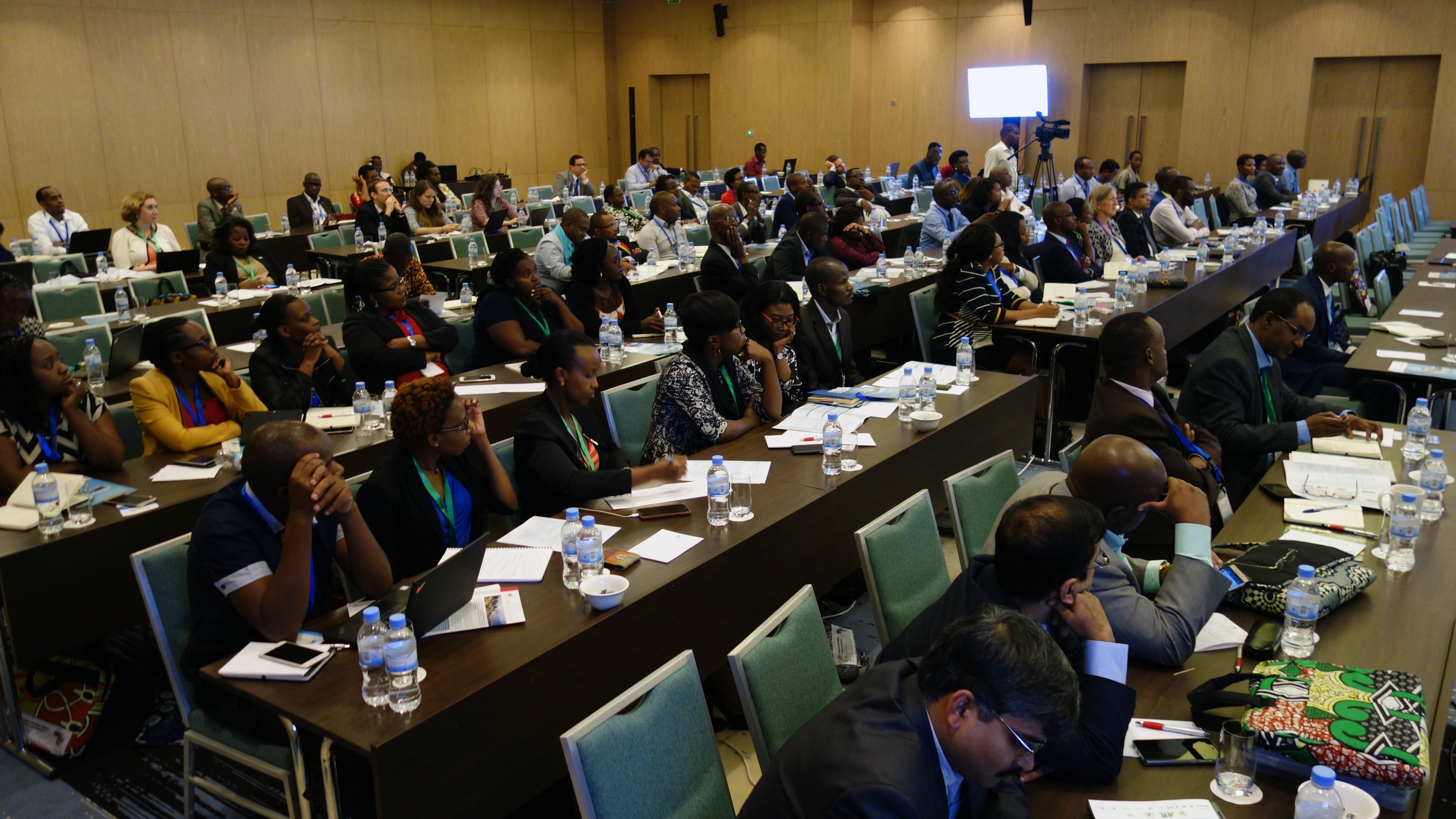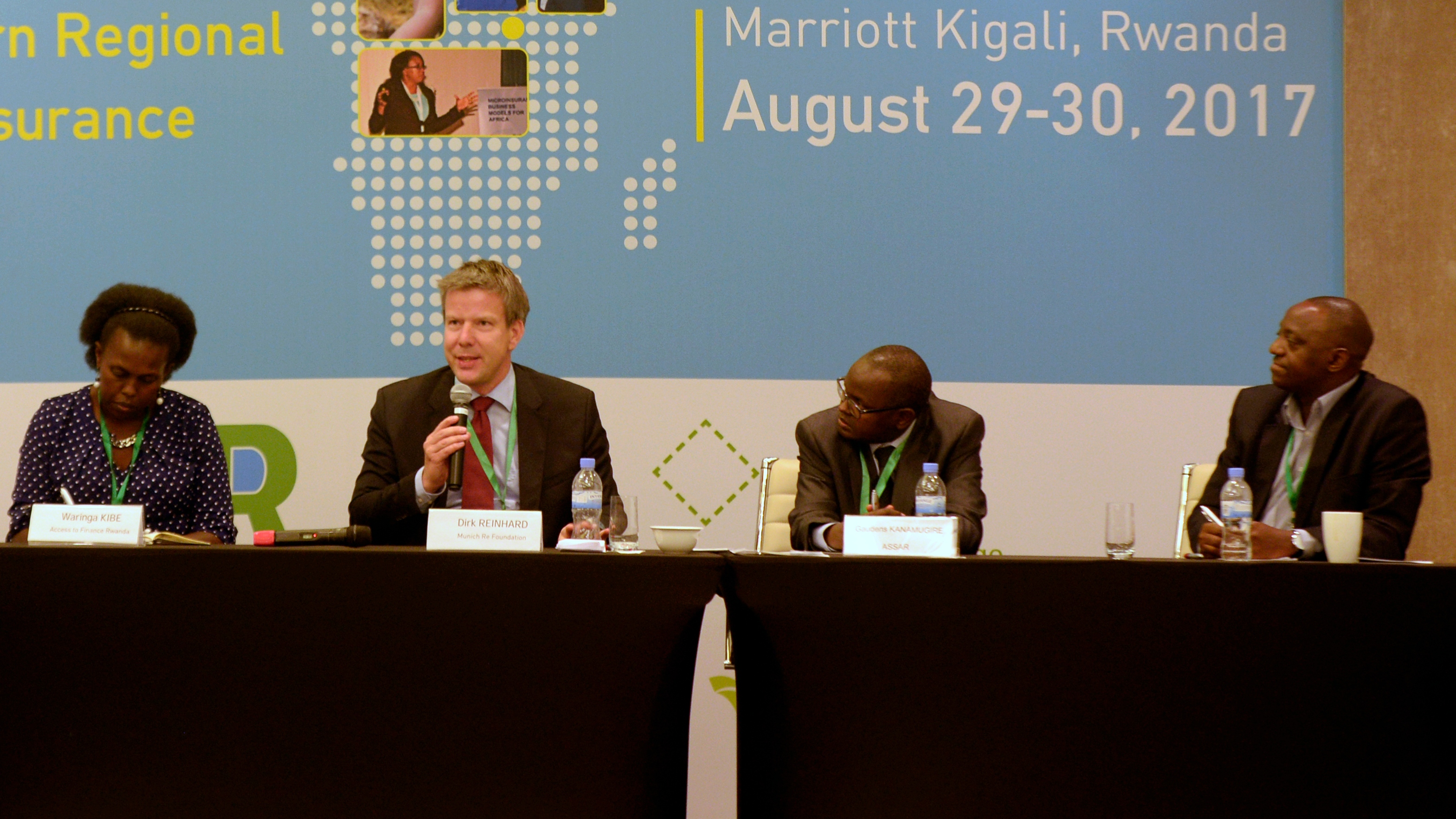“Insurers of tomorrow” will serve the informal market
4th Eastern and Southern Africa Regional Conference on Microinsurance concluded on 30 August 2017 in Kigali, Rwanda
properties.trackTitle
properties.trackSubtitle
According to the 2015 Microinsurance Landscape Study, Rwanda has the sixth highest microinsurance coverage ratio in the East African region. However, less than 2% of the over 12 million people living in the country are covered by microinsurance. Only about 9% of adults are using insurance. Overall, insurance penetration remains low in the region. How to accelerate the development of inclusive insurance markets in Southern and Eastern Africa was the overarching theme of the 4th Eastern and Southern Regional Conference on Microinsurance.
Insurance for development
According to Gaudens Kanamugire, Chair of the Association of Insurers in Rwanda (ASSAR), the microinsurance segment has been ignored for a long time. "The insurers of tomorrow will be able to understand the insurance needs of the informal sector, be capable of designing products that address the needs of the informal sector and will succeed in efficiently distributing products in the most cost-effective way" concluded Kanamugire. The informal market represents an important growth opportunity for the industry as the high-end market is highly competitive and undercutting prices challenges profitability. Furthermore, insurance is key in supporting sustainable economic development and achieving the sustainable development goals established by the UN as of January 2016:
- Insurance helps stabilise people’s incomes and therefore reduces poverty.
- Most of the developing countries are highly dependent on the agricultural sector. Insurance is key in protecting the incomes of marginalised farmers and supports the ability to make investments to increase production and reduce hunger.
- Studies in Uganda for example show that low income people who have insurance go to hospital earlier when they need to. Insurance thereby improves health and well-being.
- Insurance also helps people to better manage risks related to climate change as they transition to better and more adaptive coping mechanisms.

More than 70% of the population in Rwanda for example rely on agriculture as a source of income. The 2016 Microinsurance Landscape study conducted by Access to Finance Rwanda (AFR) shows that agriculture insurance covers around 100,000 rural households, and credit life covers just over 50,000 low-income borrowers only. According to market assessments, clients seem to have positive insurance experience despite the low insurance penetration. “On the radio, they tell us about global warming, so we decided to take out insurance for our crops”…“insurance payouts take about a week. To us that’s quick”, said farmers in Rwanda - according to findings presented by Jean Bosco Iyacu, Director of programs at AFR. However, the low scale has been a barrier to achieving business viability in agricultural schemes in Rwanda.
To overcome low availability, strong involvement from the government as well as appropriate or proportionate insurance regulation are required. For instance, a variety of entities that could distribute microinsurance do not have a license to do so. Flexible regulation that allows these entities to play a role would be an important step. Rwanda is in advanced stages of formulating specific microinsurance regulations and will soon be joining a number of countries creating an enabling regulatory environment to accelerate growth of the microinsurance sector.
Technology and mobile payments seem to be promising to reduce costs and improve customer service. Dutch PharmAccess in partnership with Safaricom and CarePay have developed a platform called M-tiba which connects payers of services, patients and health care providers. Using this platform, patients are able to pay their bills from their m-tiba wallet using mpesa. In Kenya, a large proportion of the population still pays for their health care out of their pockets, so the platform now even enables people to save for sickness using their m-tiba wallet.

The way forward
“Rwanda is tired of low insurance penetration and it is high time inclusive insurance conversation involves proper numbers”, said representatives from the industry. Insurers together with the supervisory authorities supported by AFR will work on the following topics in the near future:
- Increase accessibility and develop products that meet customer needs: The industry has to meet customer needs and provide reliable services. Sustainable and cost-effective awareness campaigns and consumer education in partnership with ASSAR are in pipeline.
- Innovation support facility to drive growth: The innovation facility, due to launch soon, will enable market players to extend their product offering to low income segments. Innovation support will focus on crop and livestock insurance, and simple life products. AFR is also promoting digital solutions and other new distribution channels to enable easy access and improve efficiency.
- Reaching small-scale farmers through a national agriculture insurance scheme: Following agriculture insurance pilots in partnership with ACRE, Rwanda is moving to the next step to design a national agricultural insurance program through a public private partnership model that will serve more small-scale farmers in Rwanda.
- Robust industry skills development to increase capacity: Increasing outreach inevitably requires addressing the current skills gaps. Innovation support together with a robust industry skills development program, and strengthening the Association of Insurers’ role in Rwanda, are key priorities within AFR’s inclusive insurance intervention strategy.
- Promoting and supporting an enabling environment: Initial mortality tables for Rwanda are in place and a microinsurance regulatory framework is underway.

The 4th Eastern and Southern Regional Conference showed that industry, supervisors and donors are committed to the inclusive insurance agenda and ready to push through the necessary changes at each stage to build a sustainable, inclusive insurance market and enable millions of people working in the informal sector to manage their risks and improve their livelihoods. Munich Re Foundation will take up this role and continue to support the efforts in developing microinsurance markets. Together with its partners, it will organise the 14th International Microinsurance Conference taking place in Lusaka, Zambia in November 2018 to facilitate the exchange of knowledge and experience. |
--------------------------------------------------------------------------------------------------------------------- |
About the event
The Microinsurance Learning Sessions were hosted by the Association of Insurers of Rwanda (ASSAR), Access to Finance Rwanda (AFR) and Munich Re Foundation with support from ILO’s Impact Insurance Facility, Cenfri, Financial Sector Deepening Africa (FSDA), the Microinsurance Network and the A2ii.